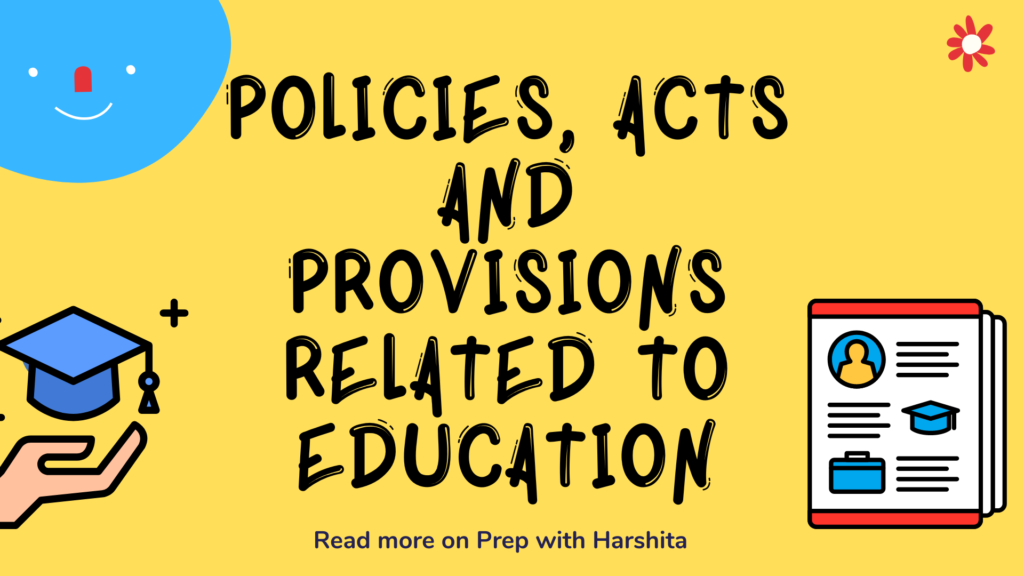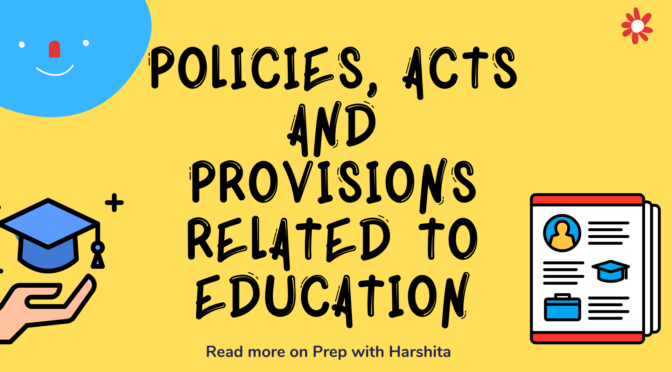In India, there are several policies and acts related to education.
Here are some notable ones:
- Right to Education (RTE) Act 2009: The RTE Act is a landmark legislation that guarantees free and compulsory education for children between the ages of 6 and 14. It emphasizes the importance of equity and inclusivity by prohibiting discrimination, requiring the reservation of seats for disadvantaged groups, and setting standards for infrastructure and teacher qualifications. The act aims to ensure that every child has access to quality education, regardless of their socio-economic background.
- National Education Policy (NEP) 2020: The NEP 2020 is a comprehensive policy that aims to transform the education system in India. It focuses on several key areas, including early childhood care and education, foundational literacy and numeracy, curriculum reforms, multidisciplinary education, teacher training, and the use of technology. The policy emphasizes holistic development, flexibility, and the integration of vocational education and skills training.
- Sarva Shiksha Abhiyan (SSA): SSA is a flagship program launched in 2001 to achieve universal elementary education. It aims to enhance access, enrollment, and retention rates in primary and upper primary schools. SSA focuses on bridging gender and social gaps in education, improving the quality of teaching and learning, and promoting community participation in education. It also addresses issues such as infrastructure development, provision of free textbooks, and support for children with special needs.
- Rashtriya Madhyamik Shiksha Abhiyan (RMSA): RMSA was launched in 2009 with the objective of enhancing access to secondary education and improving its quality. The program aims to increase enrollment rates in secondary schools, reduce dropout rates, and provide a more inclusive and equitable education system. RMSA focuses on improving infrastructure, teacher recruitment and training, vocational education, and promoting ICT-enabled learning.
- Mid-Day Meal Scheme (MDM): The MDM scheme is a centrally sponsored program that aims to enhance enrollment, retention, and attendance in schools by providing free and nutritious meals to children. The scheme covers government and government-aided schools, and it aims to improve the nutritional levels of children, reduce malnutrition, and promote better learning outcomes.
- National Skill Development Mission (NSDM): The NSDM was launched in 2015 to address the skills gap and promote skill development among Indian youth. The mission aims to provide vocational training, upgrade existing skills, and create a skilled workforce that meets the needs of various sectors. It focuses on industry-relevant training programs, certification, apprenticeships, and entrepreneurship development.
- Kendriya Vidyalaya Sangathan (KVS) and Navodaya Vidyalaya Samiti (NVS): KVS and NVS are central government organizations that operate Kendriya Vidyalayas (central schools) and Navodaya Vidyalayas (residential schools), respectively. These schools provide quality education and cater to the educational needs of children from various backgrounds. They follow a common curriculum and offer a range of co-curricular activities.
- National Scholarship Portal (NSP): NSP is an online platform that provides a range of scholarships to students at various levels of education. It aims to support deserving students financially and encourage them to pursue higher education.
- Samagra Shiksha Abhiyan: Samagra Shiksha Abhiyan is an integrated scheme for school education that subsumes the Sarva Shiksha Abhiyan (SSA), Rashtriya Madhyamik Shiksha Abhiyan (RMSA), and Teacher Education (TE) programs. It aims to provide quality education from pre-primary to higher secondary levels.
- National Council of Educational Research and Training (NCERT): NCERT is an autonomous organization that develops and publishes textbooks and educational resources for schools in India. It sets curriculum frameworks, promotes educational research, and offers guidance to state governments and educational institutions.
- National Testing Agency (NTA): NTA is responsible for conducting national-level entrance examinations for admission to higher education institutions in India. It conducts exams such as Joint Entrance Examination (JEE), National Eligibility cum Entrance Test (NEET), and Common Management Admission Test (CMAT).
- National Institute of Open Schooling (NIOS): NIOS is an autonomous institution that provides open and distance learning opportunities to students who cannot attend regular schools. It offers academic and vocational courses at the secondary and senior secondary levels.
- Inclusive Education: The government has various provisions to promote inclusive education, ensuring that children with disabilities and special needs have access to education. This includes the provision of inclusive classrooms, assistive devices, and support systems to enable their participation in mainstream schools.
- Right of Children to Free and Compulsory Education Rules, 2010: These rules were framed under the RTE Act 2009 and provide detailed guidelines and procedures for the implementation of the act. They cover aspects such as the appointment of teachers, pupil-teacher ratios, and monitoring mechanisms.
Also Read: RTE act 2009

Also Visit: Prep with Harshita

